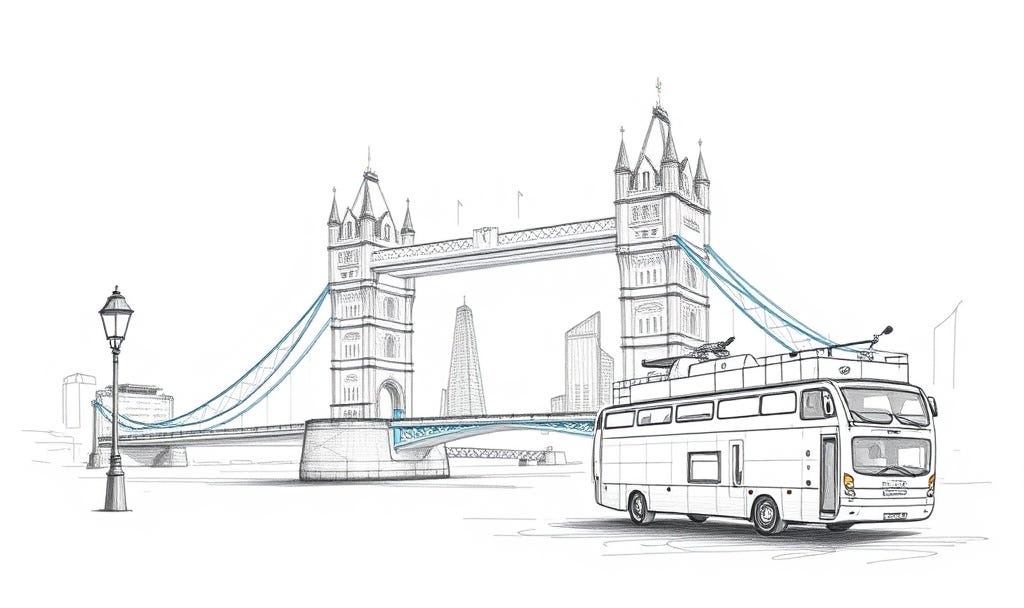The Clash | London Calling
The Clash’s “London Calling” - how producer Guy Stevens swung ladders, poured wine on pianos, and helped create punk’s most iconic anthem during five desperate weeks at Wessex Studios in 1979.
☕ Would you like to buy me a coffee?
Story Behind “London Calling”
The Producer They Had to Find in a Pub
By summer 1979, The Clash were drowning. Their manager was gone. Their label wanted them to fail. Songwriters Joe Strummer and Mick Jones hadn’t written anything new in over a year [1]. The punk boom that made them famous had died in 1977, and they were arguing with CBS Records about whether their third album should even be a double LP while buried in debt they didn’t know they’d signed up for [1].
They needed someone who understood desperation. Someone who’d throw chairs if that’s what it took. So Strummer went pub-crawling through Oxford Street looking for Guy Stevens, a legendary producer who’d been kicked out of the music industry for his drinking and drug problems [2]. When they finally tracked him down, Stevens listened to their demos and agreed immediately. CBS Records was horrified. But The Clash wouldn’t budge [3].
Five Weeks of Controlled Chaos at Wessex Studios
Starting in August 1979, The Clash entered Wessex Studios in North London for what would become five to six weeks of 18-hour recording sessions [1]. Stevens’ production methods were exactly as chaotic as CBS feared. He poured wine over the piano while Strummer was recording. He swung ladders around the studio. He threw chairs against walls when CBS executives visited [1]. But bassist Paul Simonon later said Stevens’ work was exactly what they needed—his emotional chaos coaxed their best performances out of them [2].
The title track itself drew from multiple anxieties. Strummer took the title from the BBC World Service’s wartime station identification he’d heard growing up in Germany [4]. The nuclear anxiety came from Three Mile Island’s meltdown earlier that March [5]. The line about London drowning referenced fears that the Thames would flood central London—Strummer lived in a riverside high-rise, so he joked he’d be fine [4]. The “phoney Beatlemania has bitten the dust” wasn’t about The Beatles at all, but a West End show that had just closed after copying them for years [4]. Even the desperation was real: as Strummer said, “We felt that we were struggling about to slip down a slope or something, grasping with our fingernails. And there was no one there to help us” [5].
“London Calling” Recording and Production Details
Guy Stevens and the One-Take Philosophy
Stevens produced “London Calling” at Wessex Studios, the same former church hall where the Sex Pistols had recorded [5]. Engineer Bill Price worked alongside Stevens’ madness, capturing performances that were often first or second takes [1]. Stevens didn’t care about technical perfection—he cared about emotional truth. When he wasn’t throwing furniture, he was grabbing Strummer by the throat and saying “I deal with emotions” [6].
The song itself merged punk aggression with reggae’s undulating bassline, creating what would later be called post-punk [5]. Strummer’s snarling vocals laid over slashing staccato guitar riffs while the rhythm section—Simonon’s bass and Topper Headon’s drums—gave it a hypnotic drive [5]. The song fades with Morse code spelling S-O-S, reinforcing the emergency broadcast feeling that runs through the entire track [5].
The Spontaneity That Saved Them
Many songs on the album were recorded in one or two takes, with Stevens creating what the band called “a rock & roll atmosphere” through his unconventional methods [1]. For Paul Simonon especially, Stevens’ approach was liberating. When Simonon apologized for a bass error on another track, Stevens told him not to worry—the best rock and roll songs have mistakes [7]. That spontaneity and Stevens’ belief in their instincts transformed the recording sessions from potentially disastrous into career-defining.
The entire album was completed in those five to six weeks, with the title track leading the charge as their most fully realized statement about the apocalyptic anxieties of 1979 [1].
Notes About “London Calling” by The Clash
Release Date: December 7, 1979 (single), December 14, 1979 (album)
Duration: 3:19
Genre: Punk Rock / Post-Punk / Reggae-influenced Rock
Album: London Calling (3rd studio album, track 1)
Writers: Joe Strummer, Mick Jones
Producer: Guy Stevens
Engineer: Bill Price
Label: CBS Records (UK), Epic Records (US)
Chart Performance: #11 UK Singles Chart (highest-charting Clash single until 1991), Top 40 Australia
Grammy Hall of Fame: Inducted 2007
The Clash “London Calling” Era Band Details
Album Details
Album: London Calling
Release Date: December 14, 1979 (UK), January 1980 (US)
Label: CBS Records (UK), Epic Records (US)
Producer: Guy Stevens
Engineers: Bill Price, Jerry Green (additional)
Recording Studio: Wessex Sound Studios, North London
Recording Period: August-September 1979 (5-6 weeks)
Album Concept: Genre-expanding double album bridging punk with reggae, rockabilly, ska, jazz, and R&B
Sales: Over 5 million copies worldwide, platinum in US
Critical Reception: Ranked #8 on Rolling Stone’s 500 Greatest Albums (2003), #16 (2020)
Grammy Hall of Fame: Inducted 2007
Band Members/Personnel
Joe Strummer - Lead vocals, rhythm guitar, piano
Mick Jones - Lead guitar, piano, harmonica, backing vocals
Paul Simonon - Bass guitar, backing vocals
Topper Headon - Drums, percussion
Mickey Gallagher - Organ (from Ian Dury & the Blockheads)
The Irish Horns - Brass section
Guy Stevens - Producer
Bill Price - Engineer
Jerry Green - Additional engineer
Ray Lowry - Album design
Pennie Smith - Album photography
Production Notes
Second album after firing manager Bernard Rhodes
Written following year-long writer’s block for Strummer and Jones
Rehearsed at Vanilla Studios in Pimlico during mid-1979
Many songs recorded in one or two takes
Stevens’ unconventional methods included swinging ladders and throwing chairs to create atmosphere
Album sold as double LP for price of single album
Cover photo shows Simonon smashing bass at Palladium, NYC (September 21, 1979)
Cover design inspired by Elvis Presley’s debut album
Guy Stevens died in 1981 from alcohol-related overdose; this was his final production work
Interesting Facts About “London Calling”
The Cadillac Bet That Almost Paid Off
BBC Radio 1 DJ Annie Nightingale made a bet with Joe Strummer that “London Calling” would reach the UK Top 10 without The Clash appearing on Top of the Pops—the stakes were a Cadillac, inspired by the album’s second track “Brand New Cadillac” [5]. When the single peaked at #11, just missing the Top 10, Nightingale was saved from buying a Cadillac when a listener donated one instead [5]. That Cadillac was subsequently auctioned to raise funds for Corby, a recession-hit steel town, turning a lost bet into something meaningful [5]. The single spent a total of 15 non-consecutive weeks on the UK Singles Chart, falling off after 10 weeks before re-entering twice—proof that the song’s apocalyptic message kept finding new audiences [5].
The Music Video Shot in Freezing Rain on the Thames
Director Don Letts filmed the music video on a barge at Festival Pier next to Albert Bridge in Battersea Park on a cold, rainy night in early December 1979 [5]. Letts, who couldn’t swim and didn’t realize rivers have tides, watched in terror as his camera boat kept drifting away from the pier while rain poured down on the band [4]. The resulting grainy, rain-soaked footage perfectly captured the song’s apocalyptic urgency, helping propel both the single and album to success [5]. That visual—The Clash performing in miserable weather on the Thames while Strummer sang about London drowning—became one of punk’s most iconic images. Years later, when Bruce Springsteen, Elvis Costello, Dave Grohl, and Steven Van Zandt performed the song as a tribute at the 2003 Grammys following Strummer’s death, they were honoring not just a song but an entire moment when punk rock proved it could address genuine anxiety without losing its edge [8].
Common Questions
Q: What is “London Calling” by The Clash about? A: The song addresses multiple apocalyptic anxieties from 1979: nuclear disaster (referencing Three Mile Island’s meltdown in March), Thames flooding fears, police brutality, and the end of the punk boom [5]. Strummer used the BBC World Service’s wartime station identification as the title, creating an emergency broadcast feeling [5]. The band was also processing their own desperation—buried in debt, without management, and fighting with their label [1].
Q: Who produced “London Calling”? A: Guy Stevens produced the track and album at Wessex Studios [5]. Stevens, known for his work with Mott the Hoople and Free, had been pushed out of the industry due to alcohol and drug problems [2]. His unconventional production methods—swinging ladders, throwing chairs, pouring wine on pianos—created an emotionally charged atmosphere that helped The Clash deliver their best performances despite CBS Records’ objections to hiring him [1].
Q: Why did “London Calling” peak at #11 in the UK? A: BBC Radio 1 DJ Annie Nightingale bet Joe Strummer a Cadillac that the song would reach the Top 10 without The Clash appearing on Top of the Pops [5]. When it peaked at #11, it became their highest-charting single until “Should I Stay or Should I Go” hit #1 in 1991 [5]. Despite missing the Top 10, the song spent 15 non-consecutive weeks on the chart and became one of punk’s most enduring anthems [5].
Q: When was “London Calling” inducted into the Grammy Hall of Fame? A: The 1979 recording was inducted into the Grammy Hall of Fame in 2007, recognizing its lasting qualitative and historical significance [1]. The album London Calling is consistently ranked among the greatest albums of all time, appearing at #8 on Rolling Stone’s 2003 list of the 500 Greatest Albums [1].
Q: What does the Morse code at the end of “London Calling” mean? A: The song fades out with Morse code spelling S-O-S, reinforcing the emergency broadcast theme and the urgent sense of desperation throughout the lyrics [5]. This detail emphasizes the song’s apocalyptic warnings about nuclear disaster, environmental catastrophe, and social collapse.
References
[1] London Calling - Wikipedia. https://en.wikipedia.org/wiki/London_Calling
[2] Guy Stevens - Wikipedia. https://en.wikipedia.org/wiki/Guy_Stevens
[3] The Clash: London Calling - Classic Albums - Vinyl Chapters. https://www.vinylchapters.com/the-clash-london-calling-classic-albums/
[4] London Calling by The Clash - Songfacts. https://www.songfacts.com/facts/the-clash/london-calling
[5] London Calling (song) - Wikipedia. https://en.wikipedia.org/wiki/London_Calling_(song)
[6] Classic Album: The Clash – London Calling. https://www.classicpopmag.com/features/classic-album-the-clash-london-calling/
[7] The Clash – London Calling | Releases | Discogs. https://www.discogs.com/master/19382-The-Clash-London-Calling
[8] 15 Great Grammy Tribute Performances - Rolling Stone. https://www.rollingstone.com/music/music-lists/15-great-grammy-tribute-performances-17553/




